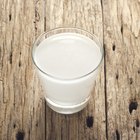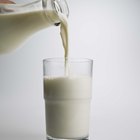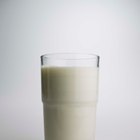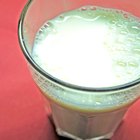Lilechka75/iStock/GettyImages
Milk is an important part of a child's diet, because it helps to deliver calcium and nutrients that promote lifelong health. Young children -- those between the ages of 1 and 2 -- typically drink whole milk and may continue to do so throughout childhood. Most adults, however, shy away from whole milk because it is high in calories and saturated fat.
The Skinny on the Fat
Some of the qualities that make whole milk a good drink for young children make it less desirable for adults. Whole milk is high in saturated fat and, as a result, in calories. A glass of whole milk has nearly twice as many calories as a glass of skim milk, half again as many as a glass of 1 percent milk, and a quarter again as many as a glass of 2 percent milk. Three glasses of whole milk a day would exceed an adult's recommend intake of saturated fat, without even taking into account other foods eaten that day.
The Recommendations
More than 70 percent of the calcium Americans consume comes from milk products, including whole milk, according to "Dietary Guidelines for Americans," jointly published by the Department of Agriculture and the Department of Health and Human Services. Because of the health risks of saturated fat, which is linked to heart disease, obesity and other health problems, the Dietary Guidelines recommend that adults drink lower-fat milk as a way to reduce saturated fat intake.
The Lactose Factor
In addition to concerns about fat and calories, some adults simply can't digest whole milk -- or any kind of milk -- effectively. In fact, the mutation that allows adults to digest the lactose found in milk is a relatively recent introduction into the human genome. It is only common in populations with a long history of drinking milk products. As a result, approximately 65 percent of the world's adults have some degree of difficulty digesting milk.
Take a Larger View
The health risks associated with high levels of saturated fat don't mean that adults, or at least adults with the right genes, can't enjoy the taste of whole milk. Keep an eye on the level of unhealthy foods in your diet overall. This is a much more productive strategy than simply avoiding certain foods as "bad." Adults who enjoy whole milk and are able to digest it can drink it occasionally as long as they make it part of a balanced diet, keeping a careful eye on their overall intake of saturated fats.
Related Articles

Why Is Milk So Fattening?

Cold Milk for Weight Loss

Whole Milk Vs. Lactaid Milk
Nutrition Information for Onken Yogurt

Difference Between Fermented Milk & ...

Bad Effects of Chocolate

Milk Protein for Skin Care

Can You Drink Milk That Expires the ...

Dangers of Goat Milk

Does Milk Thistle Lower Liver Enzymes?

The Amount of Lactose in Yogurt

Does Soaking Elk Roast in Milk Do ...

How to Cook With Lactaid

How to Make a Cinnamon Milk Face Mask

Dairy Substitutes for Quiche

Whole vs. Low-Fat Buttermilk

Can I Dilute Whipping Cream to Sub Milk?

Skin Benefits of Eating Coconut Oil
How to Substitute Half & Half for Whole ...

Alkaline Diet & Protein Foods
References
- NHS Choices: Milk and Dairy Foods
- Minnesota Department of Health: Frequently Asked Questions About Milk
- U.S. Department of Health: Dietary Guidelines for Americans 2010
- Harvard School of Public Health: Fats and Cholesterol - Out With the Bad, In With the Good
- Genetics Home Reference: Lactose Intolerance
- Slate: The Most Spectacular Mutation in Recent Human History
Writer Bio
Dr James Holloway has been writing about games, geek culture and whisky since 1995. A former editor of "Archaeological Review from Cambridge," he has also written for Fortean Times, Fantasy Flight Games and The Unspeakable Oath. A graduate of Cambridge University, Holloway runs the blog Gonzo History Gaming.